Listening to Maye’s account of her husband’s ordeal, one can’t help but wonder if this is the 21st century or a return to the dark days of 1937 or 1944. Raids at dawn, absurd accusations, and long periods in custody. This is the harsh reality in Crimea and Russia, which was underestimated in Ukraine until 2022. Fourteen years of imprisonment without substantial evidence.
– It’s been over four years, but when I mention that date, it’s as if everything inside me turns upside down, – says the 35-year-old Crimean Tatar from Bakhchysarai. – May 21, 2018, during the holy month of Ramadan, a time of fasting for us Muslims. Server went to the mosque as he always did. He returned around five in the morning. We had just finished eating and went to bed when FSB [Russian Federal Security Service] officers stormed into our house. It’s terrifying to recall. They pushed my father-in-law to the floor, injuring his hand. After a four-hour search, they took Server, accusing him of terrorism under Article 205.5.2 of the Russian Criminal Code. Server was not alone; they arrested about twenty people in Bakhchysarai and the surrounding area, linking them to the ‘second Bakhchysarai group’ in the criminal case.
Since then, Mustafayev has been in custody, initially in different detention centers, and from September 2022, in Corrective Colony No. 1 in Tambov. After a three-and-a-half-year investigation, on September 16, 2021, he was sentenced to 14 years in a strict-regime prison by the Southern Military District Court in Rostov-on-Don.
The “second Bakhchysarai group” refers to participants of the organization “Hizb ut-Tahrir,” banned in Russia due to alleged extremism and terrorism. The authorities have been targeting this group in Crimea since 2014. “Hizb ut-Tahrir” is an international political movement with the goal of uniting Muslim countries under an Islamic caliphate, but its members renounce the use of violence to achieve this.
During the search, they found nothing prohibited in our home, even though they thoroughly searched every corner, – says Mustafayeva. – They discovered a book on how to perform Islamic prayers correctly and seemed fixated on it, discussing unfamiliar words as if they were incriminating evidence.
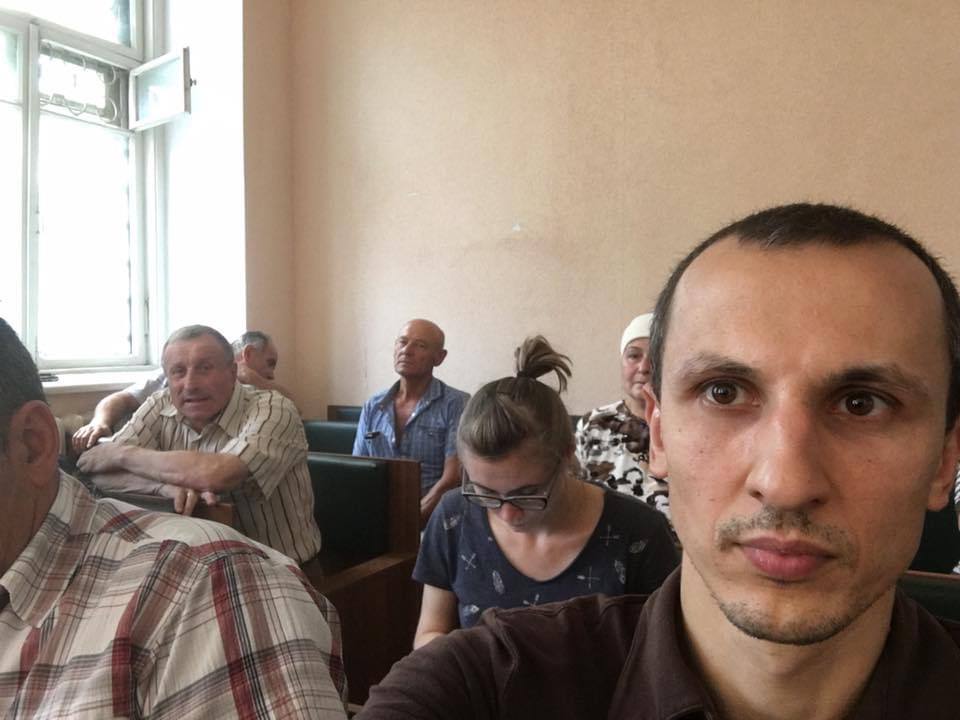
Activist, Civil Journalist, Writer.
Server Mustafayev, born in 1986, had a strong passion for his people’s history from a young age. In high school, he self-published a brochure on this subject. Before 2014, he actively participated in the movement to advocate for the rights of Crimean Tatars, offering legal support to the community.
After Russia’s annexation of Crimea, an informal human rights organization named “Crimean Solidarity” formed on the peninsula. It united activists, lawyers, and relatives of Crimean political prisoners as their numbers grew. With independent media outlets suppressed or unable to withstand pressure, citizen journalists emerged from “Crimean Solidarity” to provide accurate information. Server Mustafayev, a coordinator responsible for media relations within the organization, naturally started documenting the oppression and persecution of his people. He reported on raids and consistently updated his Facebook page.
There were times law enforcement forcibly confiscated Server’s phone – his wife recounts. He consistently aimed to expose injustices against the Crimean Tatars in Crimea. Being a truth-seeker made him a target for law enforcement, resulting in surveillance and threats from the FSB [Russian Federal Security Service].
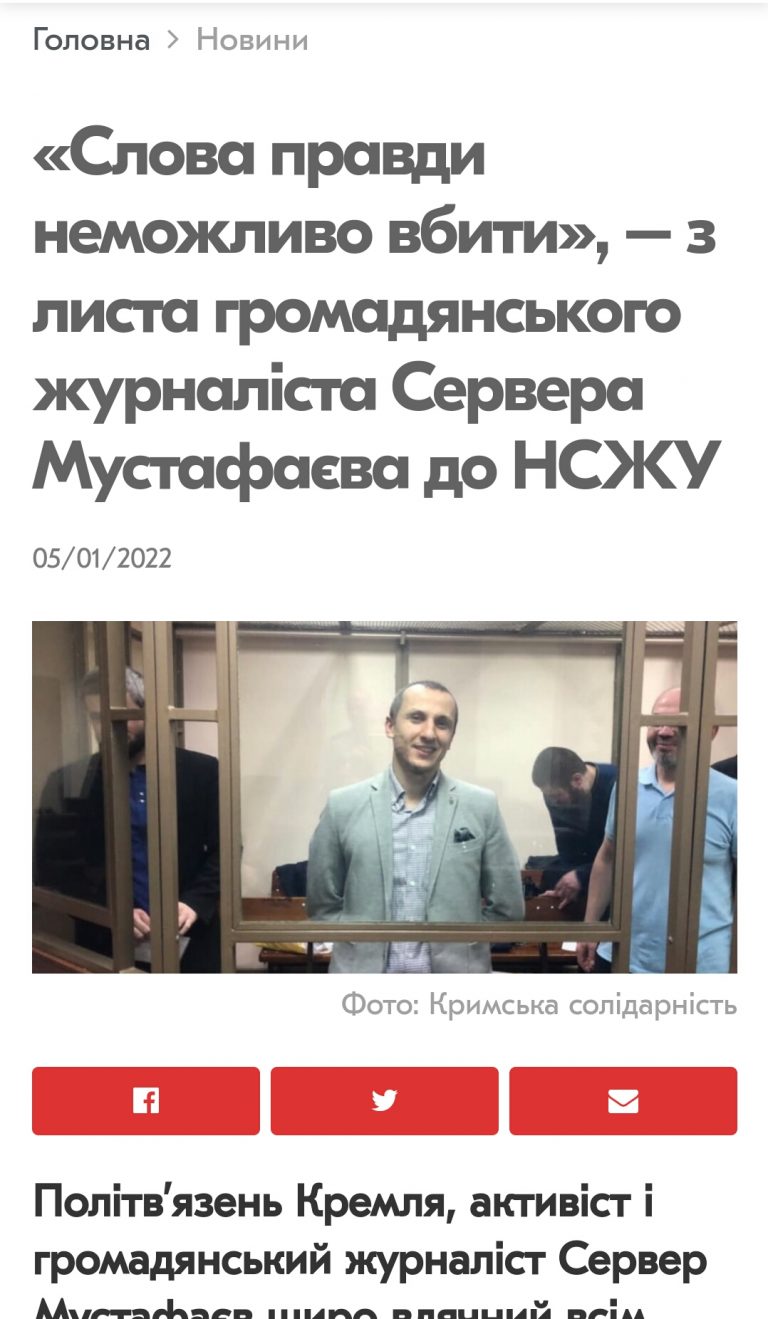
As an activist, Server Mustafayev regularly appeared on Ukrainian TV channels like UA: Pershyi Ukraine, UA:Krym, and currently “Suspilne. Krym.” He also appeared on ATR, “1+1,” “Hromadske Telebachennya,” and “Al Jazeera,“ while collaborating with “Krym. Realii” project by “Radio Svoboda” and the Crimean Tatar national agency, QHA (now QIRIM.News). His arrest in 2018 sparked strong condemnation from various Ukrainian media outlets, with the National Union of Journalists of Ukraine (NUJU) denouncing his mistreatment: “Mustafayev played a vital role in shedding light on Russian court proceedings related to Crimean Tatar activists, documenting searches and detentions. His arrest is an attempt to stifle independent voices in Crimea, intimidate Crimean Tatars, and suppress their freedom of explosion.”
While imprisoned, Server Mustafayev, with support from his wife and lawyer, maintained communication with the National Union of Journalists of Ukraine (NUJU). On January 5, 2022, an excerpt from Mustafayev’s letter to NUJU was published on nsju.org. In the letter, he expressed gratitude to journalists for highlighting the plight of political prisoners and their families, urging the media to shed more light on those unfairly labeled as “terrorists” and “extremists” by Russia.
In late 2021, Maye Mustafayeva took part in the opening of a photo exhibition titled “Citizen Journalists Matter!” at the NUJU office. Ukrainian journalists organized this event, featuring portraits of family members of imprisoned Crimean Ukrainian journalists to show solidarity with them.
Maye fondly remembers her visit to Kyiv during that time:
– When I entered the hall and saw our photos and photos of other family members of citizen journalists, I understood that people outside of Crimea haven’t forgotten about us. It was such a feeling, such emotions… Speaking at the exhibition opening, I burst into tears, unable to hold myself together. But inside me, there was so much pride and gratitude…
Server is not just a human rights advocate and journalist; he is also an accomplished writer. His literary talents were acknowledged through multiple honors in the “Crimean Fig” literary competition. He received special awards in 2019 and 2020 and, in 2022, was recognized as a laureate in the “Prose in the Crimean Tatar language” category, although he couldn’t be present to accept these accolades.
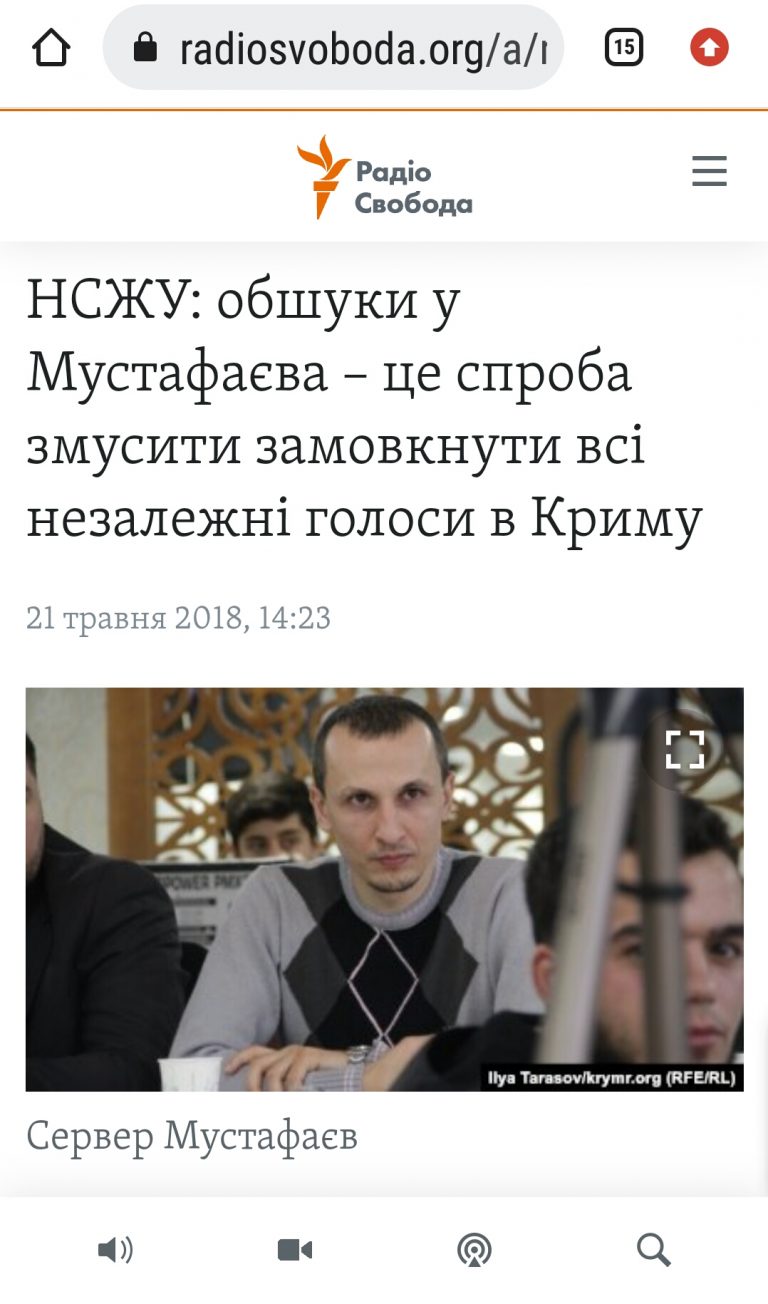
Ten Detention Centers and Six Months of Transit.
– What is my husband imprisoned for? – Maye wonders. – For his religious beliefs, for his civic stance. For openly speaking about repression and pressure on our people.
The criminal case (over 80 volumes) against Server and his comrades relies on the testimony of two anonymous witnesses.
– A mosque is an open place, accessible to anyone, any resident of Crimea, – says Mustafayeva. – Server and fellow believers were there discussing religion. An undercover witness turned on a recorder and captured their conversation. On the recording, someone asks Server, ‘Do you love someone for Allah’s sake?’ He answers, ‘Yes.’ And that’s grounds for terrorism charges?! My husband got 14 years, while others got 18, 19… It’s beyond words. Terrorism and Islam are fundamentally incompatible. It’s a label imposed on our people. If in 1944, we were ‘traitors,’ now we’re ‘terrorists’ and ‘extremists.’
During the investigation, trial, and transit to Server’s penitentiary, he was held in ten different pretrial detention centers. These facilities provided uniformly harsh conditions, almost resembling torture: cells infested with mice, inadequate lighting, and no access to the outdoors. His wife reveals that Server endured both solitary confinement and overcrowded cells during this time, resulting in a decline in his health. His eyesight worsened, and he experienced fluctuating blood pressure, among other problems.
Server faced a grueling six-month transit between detention centers, commencing in March when he was transferred from the Rostov region and reaching Tambov in September. This journey included multiple detention centers, transit stops, and seemingly endless train rides.
Since his arrest, Server has diligently documented his experiences in seven volumes of daily diaries. One of these volumes, named ‘Life Inside and Beyond Bars,’ provides insights into his stay at the Simferopol pretrial detention center. With the backing of the Crimean Tatar community, his wife aims to secure sponsors for publishing his notes and the remaining diaries.
Electronic messages from captivity can only be sent through the special “FSIN-letter” [Federal Penitentiary Service of Russia] service, and all letters are subject to censorship.
– While reading the diaries, I understand how much he leaves unsaid, – Maye says. – For example, he describes how they were transported in Stolypin-style train cars, with compartments designed for four people, but they crammed in ten. They might go a day without food, getting one meal at most. Prisoners were shackled in these train cars, and they had to carry their belongings while moving. And there were dogs. Big, barking dogs. He writes that people outside looked at them as if they were some kind of clowns.
On May 18, 2022, the anniversary of the Crimean Tatar deportation, Server and other inmates were being transported to Ufa. In a letter dated May 23, he reflects on that day, saying, “It was symbolic they transported us on May 18, a day of mourning.” He adds, “Today, Edem-aga and I are at the locations of my people’s past deportation to the Urals, celebrated in folk songs… I never imagined I would see these places from prison bars and Stolypin train cars. The letter concludes with the words, “The struggle continues; there’s not much left. InshaAllah.”
“A detective says, ‘Close the curtain, don’t look out the window.’ But outside, over a hundred of my fellow countrymen are gathered.”
Maye and Server have four children: sons Yunus (12 years old) and Yusuf (8 years old), and daughters Cemile (11 years old) and 5-year-old Nacije. The youngest has only seen her father in photographs; she was still an infant when he was arrested.
When Server was taken away, Maye was left with their children, along with her in-laws, who helped raise the grandchildren.
– Of course, things were much easier for us before, even in everyday life, – Maye sighs. – Server loves his children deeply. Even for simple things like running out of diapers or baby formula, I could call him, and he would go buy them, even at night.
The Mustafayev family receives strong support from the Crimean Tatar community, which was evident during the search.
– I’ll never forget entering the kitchen and finding an investigator there, – she says. – I drew back the curtain, looked out the window, and saw over a hundred people gathered outside. The investigator said, ‘Close the curtain; don’t draw attention.’ I replied, ‘Why shouldn’t I draw attention? I’m proud of how people from all over Crimea have come to support us.’ This support shows that my husband was among those continuing the struggle, one of many citizen journalists. And now, dozens have stepped into his shoes.
From day one, strangers began supporting us with words and actions, and this support persists. When we run low on groceries, someone promptly provides what we need. In Crimea, over a hundred families of political prisoners stand united. While we can’t replace a father for our children, Server reminds us to be proud of our nation.
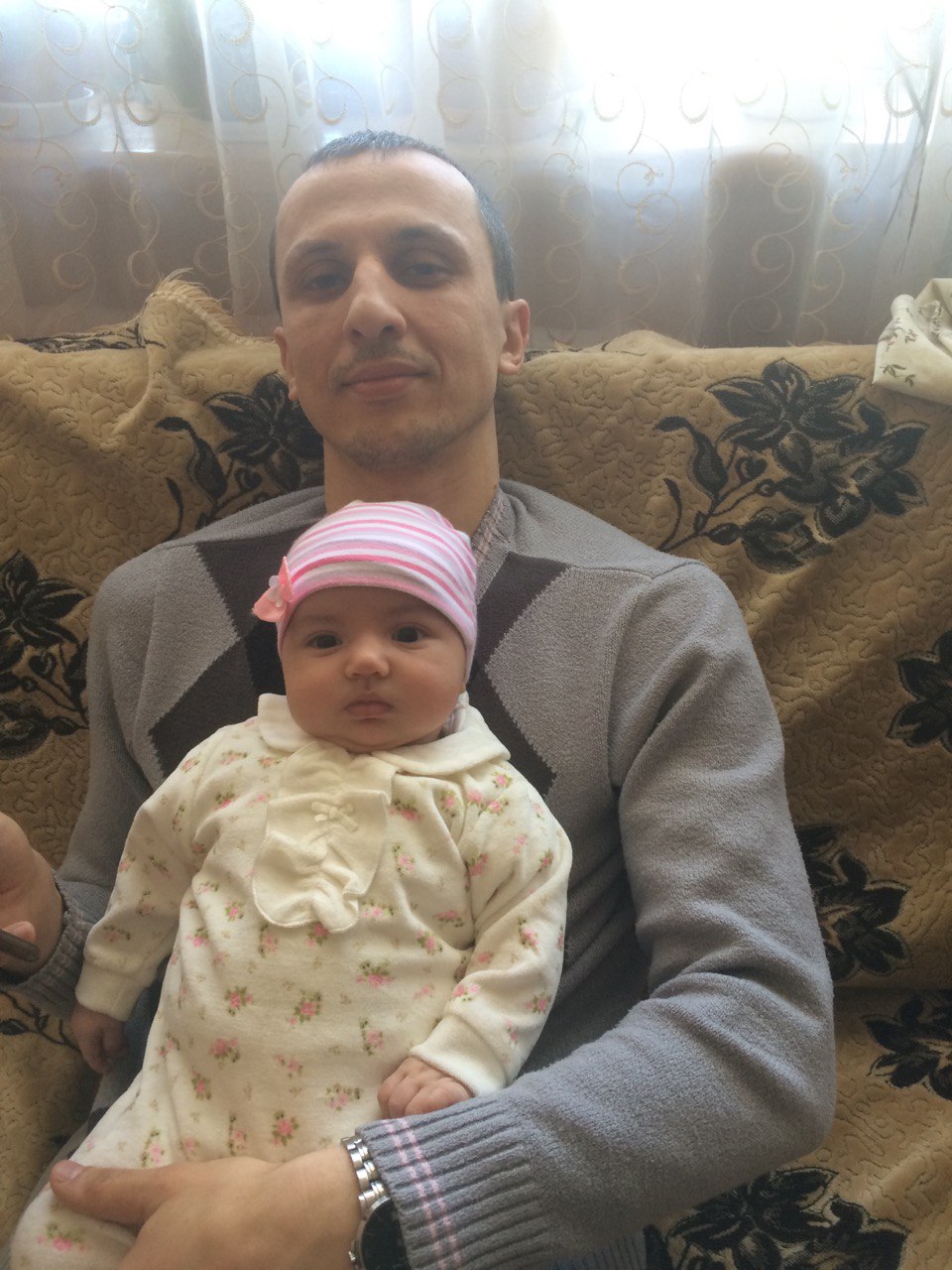
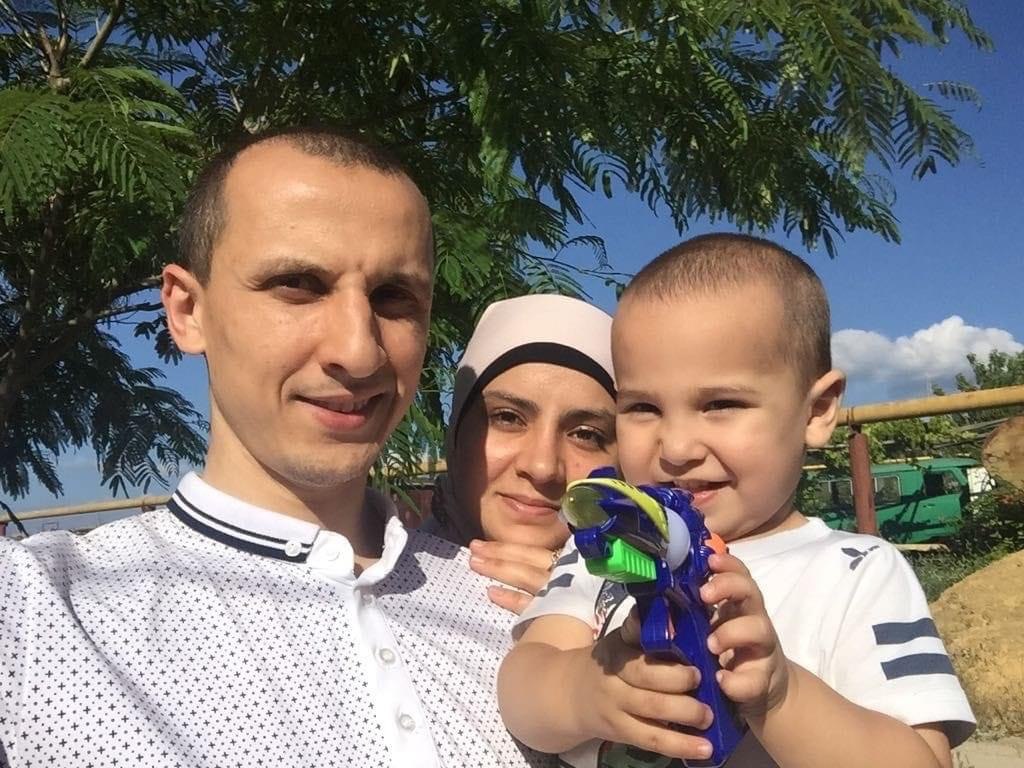
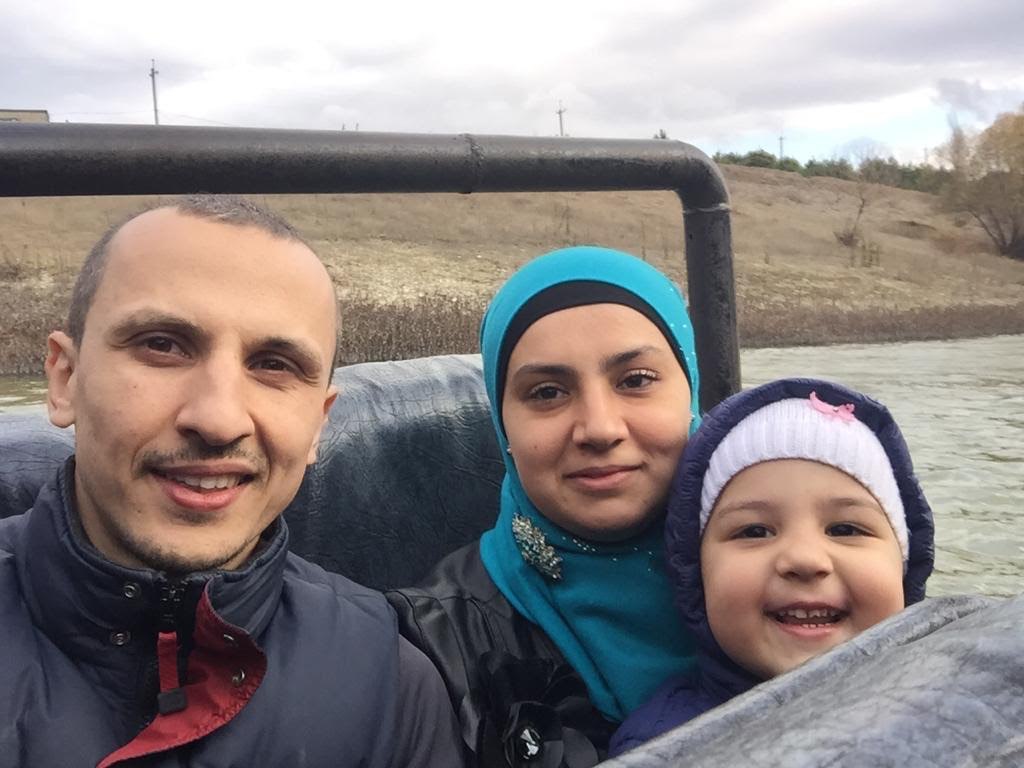
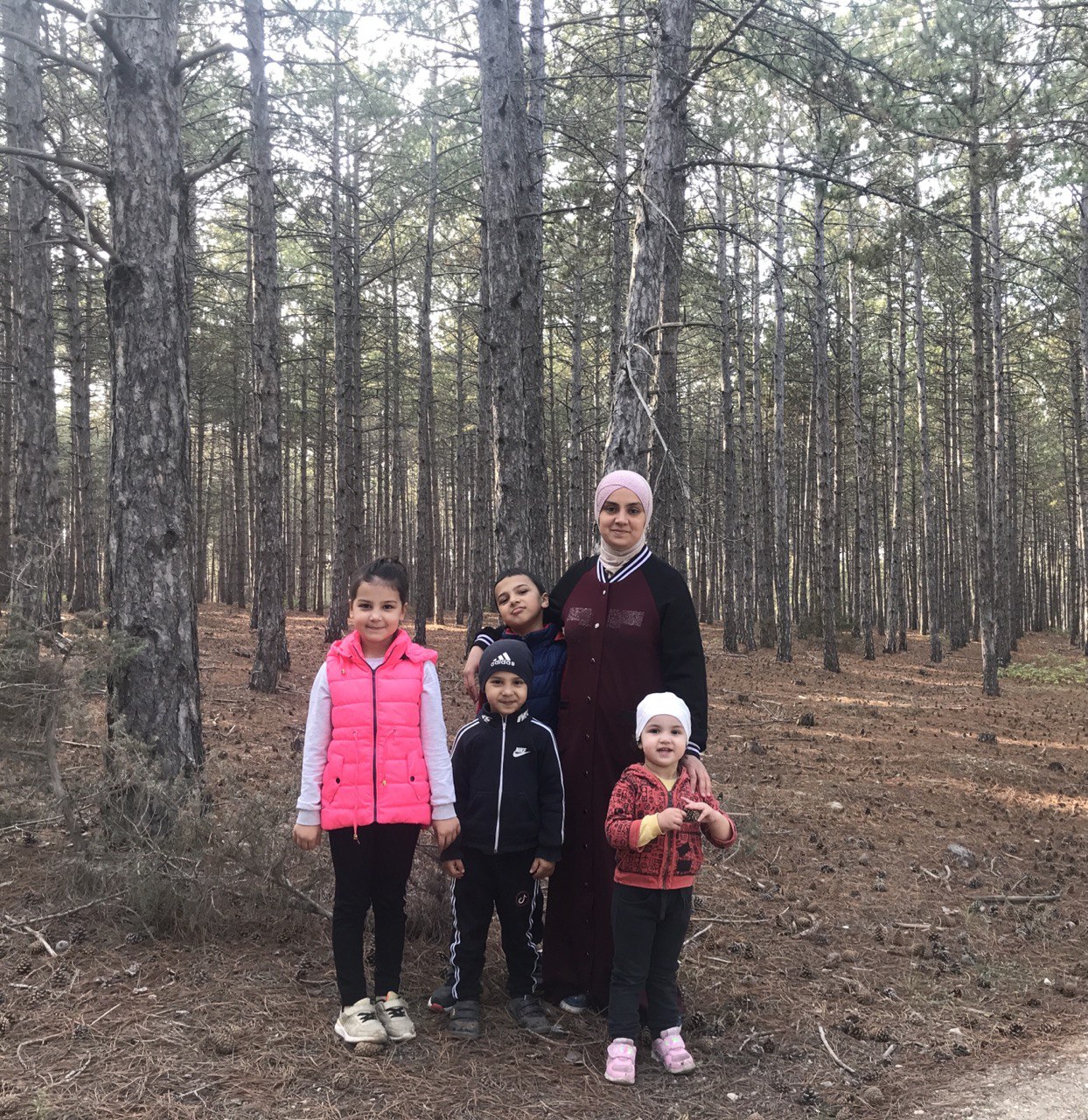
In November 2022, Server Mustafayev’s closest relatives made a 1,500-kilometer journey to visit him. New regulations allowed only two visitors, so Server’s father and sister spent two hours with him, while his mother and wife had three days together.
Maye highlights Server’s account of biased treatment in prison, including unlawful deductions and the intentional worsening of living conditions. Server openly identifies as a Ukrainian citizen and a political prisoner, with authorities reminding him of the charges against him.
However, even while in captivity, Server continues his human rights work. He successfully filed a case against one detention center and one medical unit for administrative violations regarding his detention. He has filed lawsuits against three more detention centers.
– Even in prison, he’s an inspiring optimist, – Maye says with a tearful smile. – I’ll keep fighting for my husband’s release and all political prisoners. Every voice speaking about us is a step toward victory, and we won’t stop until they’re all free.
This series, titled Executed Free Speech, is created as part of a project Drawing Ukrainian And International Audience’s Attention To Serious Violations Of Human Rights And Crimes Against Journalists And Mass Media By The Russian Federation, which is performed by the National Union of Journalists of Ukraine, with support from the Swedish non-profit organization Civil Rights Defenders.
JOURNALISTS ARE IMPORTANT. Stories of Life and Work in Conditions of War is a cycle of materials prepared by the team of the NUJU with the support of the Swedish human rights organization Civil Rights Defenders.
#CRD

 THE NATIONAL UNION OF
JOURNALISTS OF UKRAINE
THE NATIONAL UNION OF
JOURNALISTS OF UKRAINE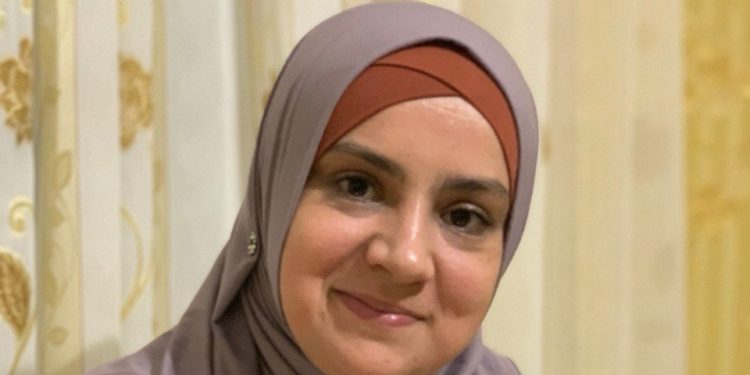
















Discussion about this post